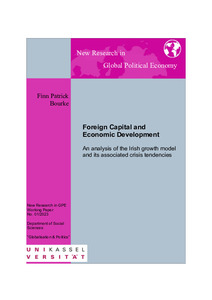| dc.date.accessioned | 2023-07-24T08:19:47Z | |
| dc.date.available | 2023-07-24T08:19:47Z | |
| dc.date.issued | 2023-07 | |
| dc.identifier | doi:10.17170/kobra-202305178037 | |
| dc.identifier.uri | http://hdl.handle.net/123456789/14911 | |
| dc.language.iso | eng | eng |
| dc.rights | Urheberrechtlich geschützt | |
| dc.rights.uri | https://rightsstatements.org/page/InC/1.0/ | |
| dc.subject | Irish economy | eng |
| dc.subject | growth model | eng |
| dc.subject | foreign capital | eng |
| dc.subject | economic crisis | eng |
| dc.subject | neoliberal hegemony | eng |
| dc.subject.ddc | 320 | |
| dc.title | Foreign Capital and Economic Development | eng |
| dc.type | Working paper | |
| dcterms.abstract | The Irish political economy is notable for the sustained and central role of foreign investment in driving economic growth, notably via the commercial activities of multinational corporations, and more recently financial services. Beginning in the 1950s, the Irish state began to move away from its protectionist policies of import-substituting industrialization, and transitioned towards a liberalized, export-led industrialization model of economic growth in order to achieve its developmental catch-up. This has resulted in the continued influx of foreign capital becoming a key pillar in the state’s strategy to establish Ireland as a competitive, attractive location in the global economy. Yet, despite the clear material advancement and higher overall societal well-being that has ultimately been achieved since the emergence of this broad framework, debates have persisted regarding the extent to which the Irish growth model provides the foundation for sustainable and equitable economic development. In light of this, this paper, taking the Celtic Tiger period and subsequent recovery period as a case study, explores the reasons behind the successful stabilization and reproduction of the Irish growth model. Drawing on regulationist and neo-Gramscian perspectives, and utilizing historical-materialist policy analysis and critical discourse analysis approaches, it investigates both the durability of Irish economic growth driven by foreign investment, and the resilience of neoliberalism in steering both policymaking and public discourse in the Irish state. This study demonstrates that despite the severity of the Irish economic crisis between the late-2000s and early-2010s, Irish neoliberal orthodoxy – understood as neoliberal hegemony – ultimately endured. In explaining this, it points to economic path dependency; the strategies of the political elites and the media; the broader international context; and the lack of viable opposition as key factors in the ultimate stabilization and reproduction of Ireland’s neoliberal, foreign-led model of capitalist development. | eng |
| dcterms.accessRights | open access | |
| dcterms.creator | Bourke, Finn Patrick | |
| dcterms.extent | v, 90 Seiten | |
| dc.contributor.corporatename | Kassel, Universität Kassel, Fachbereich Gesellschaftswissenschaften | ger |
| dc.subject.swd | Irland | ger |
| dc.subject.swd | Wirtschaft | ger |
| dc.subject.swd | Wachstumsmodell | ger |
| dc.subject.swd | Wirtschaftskrise | ger |
| dc.subject.swd | Neoliberalismus | ger |
| dc.subject.swd | Hegemonie | ger |
| dc.title.subtitle | An analysis of the Irish growth model and its associated crisis tendencies | eng |
| dc.type.version | publishedVersion | |
| dcterms.source.series | New Research in Global Political Economy | eng |
| dcterms.source.volume | No. 01/2023 | |
| kup.iskup | false | |

